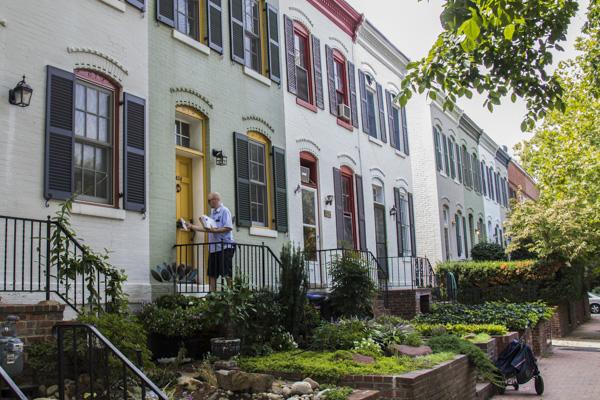Neighbors say that off-campus student parties aren’t as disruptive this year as compared to years past.
As a response to longtime complaints from Foggy Bottom neighbors about off-campus student parties for years, GW launched a community response program to investigate noise complaints last fall. Neighbors said that although the level of student noise has decreased this year, they attribute the difference to the changing mix of students who live in nearby townhouses.
Foggy Bottom Association President and longtime resident Marina Streznewski said neighbors don’t have problems with the “overwhelming majority” of students who live off campus, but there are usually a few students who are noisy. Students haven’t been as loud this year, but she said she attributes the change to quieter students living in townhouses near campus — not the effectiveness of the community responders program.
The responders program last year offers a hotline for neighbors to report incidents involving students who live off campus. Staff members will respond to complaints on 10 specified weekends throughout the year – including on Halloween, the Fourth of July and Commencement weekends.
Streznewski said some of the staff members who respond to complaints about parties have been “great,” but she has also worked with dispatchers who answer the hotline who don’t know what the community response program is. She recalled one dispatcher who understood the complaint process but said that others don’t know how to respond to complaints.
“Dispatchers don’t know about the program, how to connect us to the responders,” she said. “One or two have been rude, but the others are just confused.”
University President Steven Knapp said during a Faculty Senate meeting earlier this month that the responders consist of a 15-person committee.
University spokeswoman Maralee Csellar said officials selected committee members who responded to a job posting. She added that the staff members were trained by the Division of Student Affairs, the Division of Safety and Security and the Office of Government and Community Relations.
“The purpose of the GW Community Response Program is to provide real-time responses to community members’ concerns about off-campus incidents,” Csellar said. “After positive feedback from neighbors, the University will continue to run the program this academic year.”
She said the University receives an average of two or three calls per weekend on the hotline.
The program allows GW to document off-campus parties where officers in the University Police Department are not allowed to patrol. Students off campus are not held accountable for noise violations, unless they are sent to the Office of Student Rights and Responsibilities for disciplinary action. Neighbors initially said they were unsure if staff members would stop the noisy parties, but they were willing to try the program.
Eve Zhurbinskiy, a junior and a commissioner for the Foggy Bottom and West End Advisory Neighborhood Commission, said she believes GW’s mandate for juniors to live on campus could have reduced the noisiness of nearby townhouses.
She said neighbors probably supported the junior housing mandate because it decreased the number of students living off campus and the amount of noise they created.
“That’s causing less students off campus, less noise,” she said. “They’re benefitting from that.”
Ben Klotz, a retired professor at Temple University who now lives in Foggy Bottom, said the noise depends on which students live off campus in a given year. He said he thinks GW’s recent policy to require third-year undergraduate students to live on campus has helped keep noise at a minimum.
“It’s a good way to do it, without the atomic bomb of calling MPD,” he said of the program.
Foggy Bottom resident Scott Wayne said he used to have problems with a group of students living in a townhouse behind him, but the noise subsided once the students moved out at the end of the last academic year.
Wayne is glad he has GW’s community response program as a resource, but it doesn’t solve all the issues, he said.
“It’s helpful to have a number to call,” Wayne said. “It’s good it exists, but there are still issues.”
Robin Eberhardt contributed reporting.







